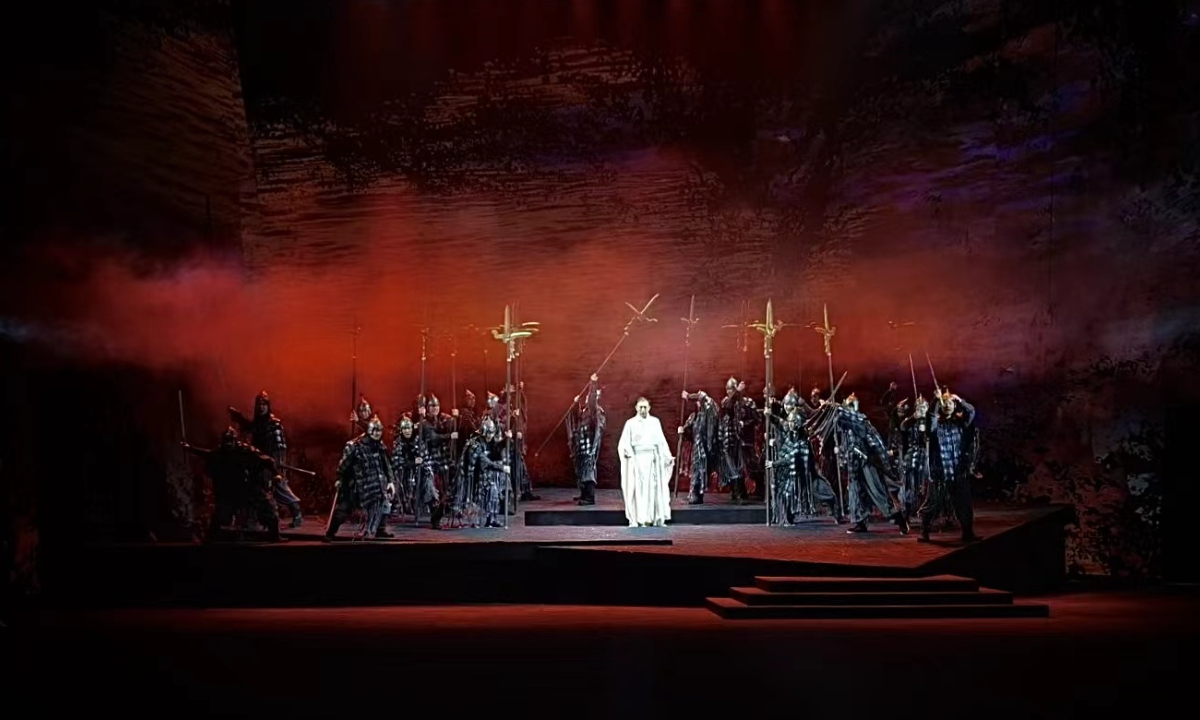
A previous stage photo of the historical drama Qu Yuan. (Photo: Courtesy of Wang Ruiguo.)
The play is based on the life story of Qu Yuan, a statesman and poet of the State of Chu during the Warring States Period (475BC-221BC), today the central and southern areas of China.
Witnessing the fall of Chu's capital, its people's displacement as well as the loss of land, Qu refused to align himself with the corrupt officials or yield to oppressive forces. He eventually drowned himself in the Miluo River in Central China's Hunan Province, completing the magnificent patriotic anthem that he had composed with his own life.
On stage, the story is going to be told using flashbacks, starting with Qu's last days before he drowned himself in despair. This part will be the biggest highlight of the whole play, said the play's director Guo Xiaonan.
"Qu had a great affection for saving humanity. His spiritual realm was far beyond that of ordinary people, which brought him a unique sense of spiritual loneliness," Guo told the Global Times in an exclusive interview on Wednesday.
"Qu also had a deep love for his state. When his ideals and ambitions in life were shattered, he chose to end his life, which I think was not a simple suicide, but a sublimation of his soul," Guo said.
"This spirit has influenced Chinese culture for more than 2,000 years, and also is the strongest part of the play."
Legend has it that after his death, the Chu people were deeply saddened and flocked to the river to pay their respects. China's time-honored Dragon Boat Festival, which falls on the fifth day of the fifth month of the Chinese lunar calendar, commemorates Qu.
Qu was listed as one of the world's four literary celebrities by the World Peace Council in 1953, the other three being Francois Rabelais, Nicolaus Copernicus and William Shakespeare. He left many immortal literary works to later generations, such as Chu Ci, or Songs of Chu, and Jiu Ge, or The Nine Songs.
His famous literary works will be presented in the drama to create a strong emotional resonance with the audience.
Guo said he believes one line from Qu's poetry will resonate the most with the audience: "Long as the way is, I will keep on searching high and low."
This well-known line embodies human being's exploration of the meaning of life, and the great spirit of perseverance and active endeavor, said Guo.
"Qu and his cultural imprint are a precious spiritual wealth not only of the Chinese nation, but also the whole humanity," he noted.
Apart from Qu's life and his spiritual world, the play will also highlight the culture of Qu's homeland Chu, a charming part of early Chinese culture.
According to Guo, the play will showcase lacquerwares and bronze wares of that time through props, lighting and dances, opening a window for the audience to view the representative culture from the 800-year history of Chu.
The play is being produced by the Hubei Changjiang People's Art Theatre and Hubei Sanxia Performance Arts Group. It is scheduled to be staged at Shanghai's Majestic Theatre on Saturday and Sunday night, as a part of the ongoing 22nd China Shanghai International Arts Festival.



